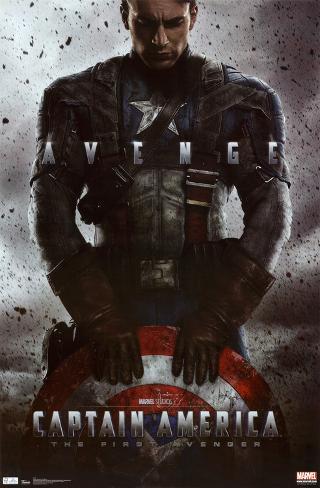The past couple of weeks have been good ones for period genre movies. Not only was the extra- terrestrial- invasion- Western Cowboys & Aliens released last weekend (look for that post some- time next week), but it's also been the debut week for the superhero- World War II film Captain America: The First Avenger.
Which was, in my estimation, an excellent movie. In the inevitable competition between Cap and Thor, I believe I prefer the former - though this is largely on account of a general preference for pulpy to cosmic action.
Luckily, Captain America has some fairly substantial pulp roots, being directed by Joe Johnson, who also directed The Rocketeer and won an Oscar for effects work on Raiders of the Lost Ark - the latter, in fact, gets a shout-out from the Red Skull, who criticizes Adolph Hitler's search for "trinkets in the desert" while he has harnessed the power of Asgard.
Yeah, Asgard. One of the numerous things the film did well was tying in the previous films, in a much more overt manner than the blink-and-miss references of previous films. As mentioned, the power source for Red Skull's weird war machines is an artifact from Thor's Asgard - the 'chapel' scene where he first acquires it makes this patently obvious - and his last scene strongly implies that he got swept up into the Bifrost. On the allied side, one of the SSR's scientists is none other than Howard Stark, future father of Tony, and apparently the inventor of a mid-20th-century hovercar.
Indeed, I was greatly impressed with the film's the pulpy super-tech, and the general look of the film - it's probably the first time I have walked out of the theater and thought "Hmm, I wonder if there's an Art of book available yet?" (There is.)
But it takes more than good art direction to make a decent film. Fortunately, Captain America pays as much attention to story and character as it does to spectacle. The focus, of course, is on Steve Rogers - I thought the film did an excellent job of showing how, even pre-serum, he displayed the qualities of bravery (his beating in the alley), intelligence (the flagpole incident), and selflessness (the grenade episode), and how the serum merely allowed him to give full expression to his already noble character, less the relatively short time he spends in the USO (which, though objectively it may have actually been an important contribution to the war effort, was certainly portrayed as Cap not living up to his potential).
Previously, I had mentioned that I thought the preview of the Tesseract at the end of Thor was an odd choice, telegraphing as it did the ending of this film. As it happens, this turned out not to be a big deal, as we see - or at least infer - what happens to Cap at the end of the war, at the beginning of the film. Knowing what's coming, the fate of the Cube isn't nearly as important (and we do see its final acquisition by the proto-S.H.I.E.L.D, in a nice scene that builds both Cap's and Howard Stark's characters, without Cap even being present).
The film proper ends with Cap's introduction to the modern world, in a scene which cunningly mirrors the first few moments after he took the serum. Showing up to explain things is Nick Fury (of course), leading into next spring's Avengers film - which, now that all the principals have been shown, was previewed in a teaser trailer after the credits. Is it May 2012 yet?
Anyway, despite that buildup I think that Captain America works equally well as a stand-alone movie. It's not without its flaws - I was particular bothered by a few scenes in the "battles montage" that screamed "obviously supposed to be in 3-D!!" - but the good parts of the movie more than make up for it.
The Rise of Merlin Episode 4 Just Got DARK!
8 hours ago















No comments:
Post a Comment